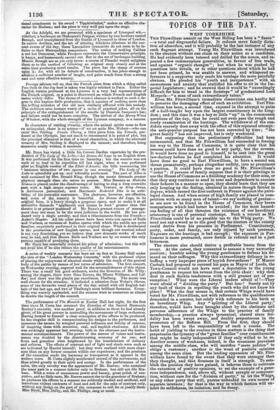The performance of The Messiah at Exeter Hall last night,
for the first time since M. Costa has assumed the direction of the Sacred Harmonic Society's concerts, was another proof, in addition to those he had already given, of his great powers in controlling the movements of large orchestras. Having formed to himself a clear conception of the effects to be produced, he has singular skill in communicating his designs to the performers, and possesses the means, by mingled personal influence and felicity of manner, of inspiring them with attention, zeal, and implicit obedience. All this was strikingly apparent last evening, both in the choruses and the instru- mental accompaniments. The power of the masses of voices and instru- ments was doubled by the discriminating economy of its use; and force and grandeur were heightened by the intermixture of delicacy and softness. The effects of contrast and of light and shade were such as are indicated by Handel himself; but they were realized with more clear- ness than on any former occasion within our experience; and the precision of the execution made the harmony as transparent as it appears in the written score. M. Costa slightly accelerated several of the movements, and thus added greatly to their spirit and energy. In the performance of the solos, the only novelty was the appearance of Mr. Reeves; who sustained the tenor part in a manner inferior only to Braham, but still not like Bra- ham. With a voice of uncommon power and beauty, great polish of exe- cution, and no little taste, Mr. Reeves cannot rise to the grandeur of Braham; he produces his effects in a manner too evidently studied and artificial, and introduces violent contrasts of loud and soft for the sake of contrast only, without any design on the part of the composer to call for or justify them. Miss Birch, Miss Dolby, and Mr. Phillips, sang as usual.


























 Previous page
Previous page